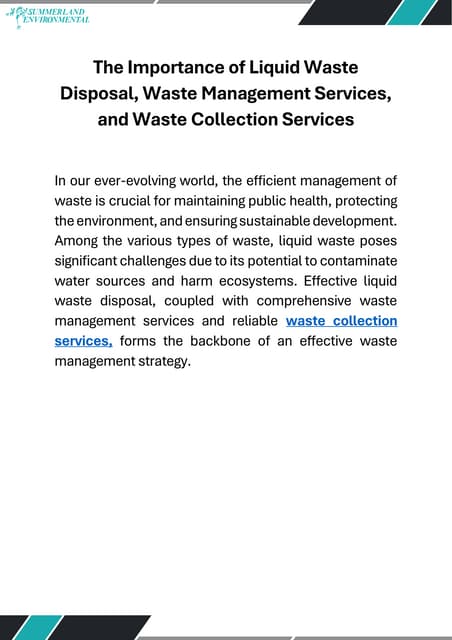Reclaim Waste Can Be Fun For Everyone
Reclaim Waste Can Be Fun For Everyone
Blog Article
What Does Reclaim Waste Mean?
Table of ContentsAn Unbiased View of Reclaim WasteExcitement About Reclaim WasteSome Ideas on Reclaim Waste You Should KnowThe Basic Principles Of Reclaim Waste The Facts About Reclaim Waste Revealed
Check out the kinds, occurrences, and types of fluid waste. Domestic sewer waste describes the waste and products from a property septic system. This kind of waste is produced by humans in houses, institutions, and other structures. This only consists of septic systems that have a drain field. The correct monitoring and disposal of domestic sewage waste need fluid waste to be transferred to a sewage therapy plant where the correct techniques and equipment are applied to cleanse and take care of waste.
Commercial waste commonly includes possible hazards, such as flammable products or a mix of fluid and strong waste products, and needs an advanced and in-depth disposal procedure. The disposal of commercial waste commonly includes the filtration of waste prior to transport to make sure safe and appropriate disposal. Hazardous waste is created from by-products and runoff of industrial procedures and manufacturing.
This sort of waste can not use the very same sewage management transport or processes as septic or business liquids. The hazardous waste management procedure requires the assessment and testing of fluid waste prior to it goes through the disposal procedure (liquid waste disposal melbourne). Runoff waste is the fluid waste that comes from drainage and excess stormwater in extremely populated locations or cities
Runoff waste can create contamination and flooding if not managed properly. Discover more regarding drain cleansing and waste management. Guaranteeing proper waste management can prevent disasters and lower ecological damage. Both people in domestic setups and experts in industrial or manufacturing industries can benefit from understanding the processes and regulations of fluid waste administration.
Some Of Reclaim Waste
Call PROS Providers today to learn regarding our waste management and disposal solutions and the correct methods to look after the fluid waste you produce.
(https://giphy.com/channel/reclaimwaste1)This so-called 'wastewater' is not just a vital resource however, after therapy, will be launched to our land, rivers or the sea. Made use of water from bathrooms, showers, baths, cooking area sinks, washings and industrial procedures is understood as wastewater.

water used to cool down machinery or tidy plant and tools). Stormwater, a kind of wastewater, is drainage that streams from farming and city areas such as roofs, parks, yards, roads, paths and gutters into stormwater drains pipes, after rain. Stormwater streams neglected straight to regional creeks or rivers, at some point reaching the ocean.
Examine This Report on Reclaim Waste
In Queensland, many wastewater is treated at sewer therapy plants. Wastewater is carried from residential or commercial websites with a system of drains and pump stations, referred to as sewerage reticulation, to a sewage treatment plant. City governments build, maintain and run most sewage therapy plants. Operators are accredited under the Environmental Management Act 1994 to release treated wastewater at an acceptable environmental standard into waterways.
The Division of Natural Resources recommends regional governments concerning managing, operating and maintaining sewage systems and therapy plants. In unsewered locations, regional governments may require owners to mount specific or family sewage treatment systems to deal with residential wastewater from bathrooms, kitchen areas, washrooms and laundries. The Division of Natural Resources authorises making use of family systems when they are shown to be effective.
Many stormwater receives no treatment. In some new class, therapy of some stormwater to remove trash, sand and gravel has actually begun using gross contaminant traps. Wastewater treatment takes place in four phases: Removes solid issue. Bigger solids, such as plastics and other items incorrectly released to drains, are eliminated when wastewater is travelled through screens.
Wastewater after that flows right into huge storage tanks where solids resolve and are eliminated as sludge. Oil and residue are skimmed from the surface area. Utilizes tiny living microorganisms knows as micro-organisms to damage down and eliminate continuing to be dissolved wastes and fine particles. Micro-organisms and wastes are included in the sludge. Removes nitrogen and phosphorus nutrients that could create algal flowers in our news rivers and intimidate marine life.
Facts About Reclaim Waste Uncovered
Nutrient elimination is not readily available at all sewer therapy plants due to the fact that it calls for pricey specialized devices. Clear liquid effluent produced after treatment might still have disease-causing micro-organisms - liquid waste disposal melbourne.

The majority of wastewater moves into the sewerage system. Under the Act, local federal governments administer approvals and licences for environmentally appropriate tasks (Periods) entailing wastewater releases that could have a regional impact.
8 Simple Techniques For Reclaim Waste
Monitoring provides factual info concerning water top quality and can validate that licence conditions are being met. The information obtained with surveillance gives the basis for making water top quality choices.
Report this page